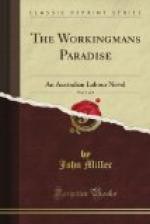rapidly, unabashed by the stares of the women or the
impudent comment of the children. Nellie, suddenly,
felt all her ill-humour turn against him. He
was so satisfied with himself. He had talked
unionism to her when she met him two weeks before,
on his way to visit a brother who had taken up a selection
in the Hawkesbury district. He had laughed when
she hinted at the possibilities of the unionism he
championed so fanatically. “We only want
what’s fair,” he said. “We’re
not going to do anything wild. As long as we get
L1 a hundred and rations at a fair figure we’re
satisfied.” And then he had inconsistently
proceeded to describe how the squatters treated the
men out West, and how the union would make them civil,
and how the said squatters were mostly selfish brutes
who preferred Chinese to their own colour and would
stop at no trick to beat the men out of a few shillings.
She had said nothing at the time, being so pleased
to see him, though she determined to have it out with
him sometime during this holiday they had planned.
But somehow, as he stepped carelessly along, a dashing
manliness in every motion, a breath of the great plains
coming with his sunburnt face and belted waist, he
and his self-conceit jarred to her against this sordid
court and these children’s desolate lives.
How dared he talk as he did about only wanting what
was fair, she thought! How had he the heart to
care only for himself and his mates while in these
city slums such misery brooded! And then it shot
through her that he did not know. With a rapidity,
characteristic of herself, she made up her mind to
teach him.
“Well, Nellie,” he cried, cheerily, coming
up to her. “And how are you again?”
“Hello, Ned,” she answered, cordially,
shaking hands. “You look as though you
were rounding-up.”
“Do I?” he questioned, seriously, looking
down at himself. “Shirt and all? Well,
if I am it’s only you I came to round up.
Are you ready? Did you think I wasn’t coming?”
“It won’t take me a minute,” she
replied. “I was pretty sure you’d
come. I took a holiday on the strength of it,
anyway, and made an engagement for you to-night.
Come in a minute, Ned. You must see Mrs. Phillips
while I get my hat. You’ll have to sleep
here to night. It’ll be so late when we
get back. Unless you’d sooner go to a hotel.”
“I’m not particular,” said Ned,
looking round curiously, as he followed her in.
“I’d never have found the place, Nellie,
if it hadn’t been for that pub, near the corner,
where we saw that row on the other night.”
The women opposite had suspended their debate upon
Mrs. Hobbs’ latest, a debate fortified by manifold
reminiscences of the past and possibilities of the
future. It was known in the little street that
Nellie Lawton intended taking a holiday with an individual
who was universally accepted as her “young man,”
and Ned’s appearance upon the stage naturally
made him a subject for discussion which temporarily
over-shadowed even Mrs. Hobbs’ baby.




